Scope of the conference
Given the prominence in our lives today of digital online media and technologies, there is a clear need to understand better their impact on us, as users and as citizens. A better scientific understanding is important in developing a next generation of conscious users of digital technologies and digital or screen-mediated forms of communication. We must go beyond the default notion of “Designed in California, made in China, criticised in Europe”! Europe must bring its strong base of scientific knowledge and humanistic values to bear on discussions about the future of online media, and social media in particular.
To this end, this conference will explore how an interdisciplinary collaboration of neurosciences and cognitive sciences, computer science, artificial intelligence and network sciences, social psychology, philosophy, behavioural economics and law, can address the opportunities and challenges presented by digital online media and, specifically, social media and by the ubiquitous presence of digital media and screens in our environments.
A roadmap for a research Agenda on Digital Media and Human Well-Being will be presented at the issue of the conference. It is the out-put of a 18 month collaboration between members of the DIGEING project. A special Challenge Session during the conference will give the opportunity to participants to feed the Roadmap with new propositions. The roadmap will then be delivered to the EU commission to serve as a basis for future EU call for projects.
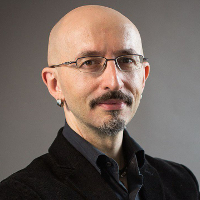
Antonio Casilli
Title : Disclosing Digital Labor: improving transparency and accountability on global hidden workforce issues
Abstract : Algorithm-driven systems and data-intensive information technologies often overlook the importance of labor and the challenges associated with it. In particular, the rhetoric surrounding the displacement of jobs by automation fails to acknowledge the role played by human labor in AI systems. Nevertheless, an expanding body of literature examines the adverse impacts of digital labor on well-being, especially mental health. Some forms of digital labor are linked to work-life permeation, mental burnout, and PTSD, while others expose workers to financial strain and precarity, which increase stress levels. The Digital Labor Disclosure challenge provides a unique opportunity to evaluate the social costs of this type of work. By formalizing digital labor’s role and mapping its global operations and supply chains, this framework builds on initiatives in green AI and workforce disclosure along multinational supply chains. The establishment of a coalition of institutions and companies is necessary in order to improve corporate accountability and transparency regarding digital labor workforce issues.
Bio : Antonio A. Casilli is a professor of sociology at Télécom Paris, “grande école” of the Polytechnic Institute of Paris and a researcher at the Interdisciplinary Institute on Innovation (i3), an institute of the French CNRS.
He is also an associate fellow in sociology at the LACI-IIAC (Critical Interdisciplinary Anthropology Center, formerly Edgar Morin Centre) of the School for Advanced Studies in Social Sciences (EHESS, Paris), where since 2007 he has been facilitating the the seminar Studying digital cultures. In 2018, he became a faculty fellow et the Nexa Center for Internet and Society of the Polytechnic University of Turin.
His main research foci are computer-mediated communication, labor and civil liberties. Since 2009, he has been coordinating several international research projects (notably in China, South Korea, Russia, Cuba, Brazil, Bolivia) focusing on online social networks, labor, health, and privacy. He also studies advanced ethno-computational methods and agent-based simulation for social science.
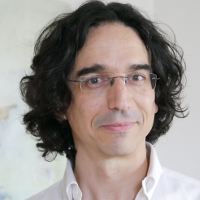
David Chavalarias
Title : Multi-scale structure of social interactions: interwoven on-line/off-line world
Abstract : TBA
Bio : David Chavalarias is Director of Research at the CNRS lab Center for Social Analysis and Mathematics (CAMS) and is the head of the Complex Systems Institute of Paris Ile-de-France (CNRS, ISC-PIF ). He studies the social and cognitive dynamics, both from the modeling and data-mining perspective, with an interdisciplinary approach grounded in cognitive and complex systems sciences.
His work on science evolution features new methods for the reconstruction of science dynamics from academic productions, as well as models of collective dynamics of scientific discovery.He also has contributed to the development of several macroscopes and visualization tools for mapping knowledge dynamics from large corpora : academic digital repositories, online media or press.

Alexandre Delanoë
Title : The Privacy Challenge (Identity or Anonymity) Privacy Based Design ?
Abstract : Identity, as a promise of modern times, seems to be an a priori in all the works about the protection of “Privacy”. However, it would be theoretically and practically beneficial to build an infrastructure based on anonymity to better protect privacy data and thus build a knowledge economy with a better distribution of economic value between users and digital infrastructure providers.
Bio : Alexandre Delanoë is the Project Manager of GarganText. As background he is sociologist, he became self-taught Haskell developer, contributor to the Debian GNU/Linux Operating System and is now working as Research engineer at CNRS.
His research deals with the Responsibility of Management in unstable ecosystems. He has been using descriptive statistics with text-mining, networks structural analysis and modeling with agent based simulation in order to map social dynamics such as controversies.
With the Digital Humanities Team at the ISC-PIF, he built GarganText, a libre software protocol that combines the advanced exploration of texts and corpora in a new ergonomy of working space, the analysis of networks and the interactive visualization of large body of texts for any language and any database.
He designed GarganText as the first General purpose decentralized and collaborative working space entirely written in a purely functional language (Haskell/Purescript).
In 2021, he was Lauréat Cristal Collectif CNRS, for his contribution to the visualisation of the COVID 19 pandemics and received the Prix de la croissance verte numérique in 2012.
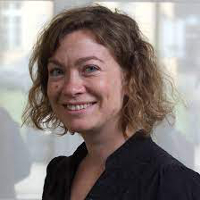
Melanie Dulong de Rosnay
Title : Digital commons, the public interest and well-being.
Abstract : The topic of Digital commons addresses public interest concerns related to digital media and well-being, in particular the techno-socio-legal aspects related to rights and policies which can support a sustainable digital ecosystem, fair access rights to data, knowledge and
information, and enhance collaboration. Access to data is crucial for science, but also to education, public services for all including vulnerable citizen, public participation, but also private innovation, as many platforms rely on full access to users’ data, without however returning the value to the society besides access to a service.
Access to data and more broadly rights pertaining to the reuse of personal data, privately-owned or hosted data, public sector information, scientific data are regulated by different legal regimes, sometimes laws, sometimes terms and conditions. Between public domain without control for the users, the scientists or the producers, and full exclusivity, there is the option to produce and share data, information and knowledge under commons-based conditions.
Bio : Mélanie Dulong de Rosnay, PhD in law, is a research professor at the French National Centre for Scientific Research (CNRS) since 2010 and director of the Center for Internet and Society of CNRS (UPR 2000) which she co-founded with Francesca Musiani in 2019. Since 2020, she has also been directing the national research network on Internet, AI and Society (GDR 2091) which structures thematically the community.
Melanie’s research focuses on digital commons, regulation by technology, information technology law and policy, and the governance of data (public, private, scientific and urban AI) as commons with the project ODECO. She recently worked on community networks within the H2020 project netCommons (network infrastructure as a commons), algorithmic regulation, peer production digital platforms, citizen science, distributed architectures, open access and open licensing (public sector information, scientific data and publications, public domain works and digital native heritage).
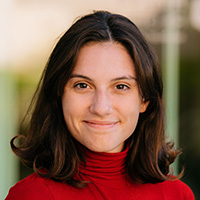
Luisa Fassi
Title : Digital embedding in relation to individuals’ mental health, cognition and identity formation
Abstract : In recent years, parents, educators, policymakers and the wider public have raised concerns about the impact of social media use on the development and mental health of adolescents. In response to these rising concerns, the scientific community has devoted extensive time and resources to investigating the potential risks arising from the use of digital technologies. In this talk, I will first discuss the evidence relating social media use to youth mental health. Secondly, I will provide an overview of the existing gaps in the literature, highlighting venues for future research. I will specifically focus on the need to study vulnerable groups, integrate mixed-method approaches and examine mechanisms.
Bio : Luisa is a PhD researcher at the University of Cambridge, where she works across the MRC Cognition and Brain Sciences Unit and the Department of Psychiatry. Her current research focuses on disentangling the links between social media use and adolescents’ mental health. Previously, she completed a Master of Science in Psychological Research at the University of Oxford, specialising in research methods and design, and a Bachelor of Science in Psychology at Erasmus University Rotterdam. During her academic career, Luisa has worked on research projects in psychiatry, cognitive psychology, and neuroscience. Alongside her interest in psychological and medical sciences, she is an active promoter of open research practices. She is a junior representative of RIOT, a Science Club promoting reproducible, interpretable, open, and transparent research. Moreover, she is a Data Champion at the University of Cambridge and a certified instructor for The Carpentries, for which she teaches foundational coding and data science skills.
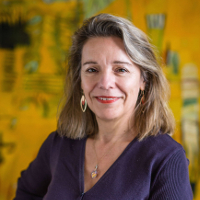
Divina Frau-Meigs
Title : Digital media literacy: fostering civic engagement, well beind and trust in the digital public sphere.
Abstract : As digital technologies and media frame our relation to space and time and our access to culture, education and jobs, the Covid-19 crisis has put in sharp relief the dependency and lack of preparedness of teachers, parents and other caregivers when it comes to conduct education with such tools and services. It is urgent to get more insights on the ways of studying connections between formal and informal ways of learning and new models of education and schooling in the 21st century. Hence the need to develop a full-fledged approach to digital competences as well as teacher training, to ensure that young people are able to appropriate the digital opportunities for learning while avoiding the pitfalls of information disorders. This process involves a full school approach and a multi-stakeholder mobilization for the benefits of democratic societies.
Bio : Divina Frau-Meigs is professor of media and ICT sociology at Sorbonne Nouvelle University, France. She holds degrees from the Sorbonne University, Stanford University and the Annenberg School for Communications (University of Pennsylvania). She is a specialist of Cultural Diversity, Internet Governance and Media and Information Literacy (MIL) as well as a researcher in the media uses and practices of young people and information disorders (radicalization, disinformation, hate speech…). She was granted the “Global MIL Award” by UNESCO and Alliance of Civilisations for her MOOC DIY MIL (2016). She is an expert with UNESCO (on MIL, social media, youth and radicalisation), with Council of Europe (on culture and datafication, on MIL and Digital Citizenship Education), with the European Union (on MIL for all and online disinformation).
She is author and (co)editor of more than 30 books and 300+ scholarly articles and book chapters, among which Faut-il avoir peur des “fake news? (La Documentation française 2019); Youth and Violent extremism on social media: mapping the research (2018, UNESCO); Digital Citizenship Education : Overview and new perspectives (CoE, 2017). Her two latest large co-editions are The Handbook of Media Education Research (Wiley, 2020) and MOOCs and the participatory challenge: from revolution to reality (Springer, 2021).
She was vice-president of IAMCR (the International Association for Media and Communication Research), with UNESCO observer status, from 2004-2008 and headed its Media Education Research section from 2009-2015. She directed CLEMI (the French Center for Media and Information Literacy) during 2013-2015 and prepared the French school response after the “Je suis Charlie” terrorist attacks. She is the co-chair of the European Chapter of AMIL (ex-GAPMIL), the Global Alliance for Partnerships in Media and Information Literacy. She represents civil society interests (academia and research) in the Internet Governance Forum (IGF) and in other global arenas (WSIS…). She holds the UNESCO chair “Savoir devenir à l’ère du développement numérique durable” (attached to MILID and ORBICOM networks) and is the founder and president of Savoir*Devenir, an NGO dedicated to XXIst century media literacies and digital citizenship. Savoir*Devenir has conducted major international projects around media literacy and digital citizenship such as Youcheck!, PlayYourRole, YouVerify!, Crossover, Enid, and Jamil (www.savoirdevenir.net/projets).

Bertrand Jouve
Title : Digital media in a sustainable world: towards inclusivity, equality and autonomy
Abstract : “Technological solutionism” is a dangerous hypothesis engaging the future of mankind. We will discuss this point. The question is not to oppose innovation, but to devise new digital technologies and promote their use in such a way as to preserve one’s own autonomous usage and to keep reversibility an open alternative. We will propose some challenges for our digital media fit in with a more learning, inclusive, responsible and autonomous society.
Bio : Bertrand Jouve has been director of The Toulouse Social Sciences and Humanities Research Institute during 6 years, Scientific Deputy Director for 5 years at the CNRS Institute for Social Sciences and Humanities and President of the French National Network of Social Science and Humanity Centers during 2 years.
He has lead a project for a Toulouse Institute for Complex Systems Studies. He’s Vice-President Treasurer of the Complex Systems Society. He regularly participates in debates on the role of big data and complexity sciences in the modeling of our societies.
His research mainly focuses on how graph theory can be used to improve our tools to analyze large-scale interaction networks. For partitioning and hierarchizing networks, he has successively used metrics on graphs, spectral graph analysis, combinatorial properties of some classes of graphs, and simplicial topology of clique complexes. He take part and promote interdisciplinary cooperation of mathematicians with other domains of science. After having worked with neuroscientists for modelling real neuronal networks, he has developed cooperation for more than fifteen years in the field of social network analysis with historians, linguists, geographers or anthropologists. More recently, his interests focused on urban mobility.
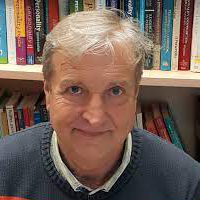
Andrzej Nowak
Title : Digital media, freedom of choice and human agency
Abstract : Freedom of choice and agency, together with the capacity for cognition are among the critical aspects of being human. Internet and social media have created unprecedented access to information and expanded the scope of choices and possibilities for action and bottom-up initiatives. AI can expand human cognition and creativity to a level not possible before. On the other hand, information technology and AI have become powerful tools of manipulation, search engines and social medial algorithms can deprive individuals of information needed for informed decisions and exposure to diverse views, and AI can result in the decline of cognitive capacities and the loss of agency. These possibilities and challenges are likely to grow exponentially with the exponential growth of AI and virtual reality, especially the Metaverse. The question is how to facilitate the growth of the potential for freedom, human agency, and cognition resulting from new technologies while at the same avoiding the dangers associated with the new technologies. More research is needed to understand how to avoid the dangers to freedom of choice and human agency brought by social media, and how to capitalize on the potential produced by social media and AI for increased freedom of choice, human agency, and cognitive abilities.
Bio : Andrzej Nowak is the Director of the Center for Complex Systems and New Technologies and r at ISS and the director of the Global Systems Center at ISS. He is also a professor at the Department of Psychology of the University of Warsaw as well as a professor at the Department of Psychology at Florida Atlantic University.
Prof. Nowak is one of the world’s leading experts on the modeling and computer simulation of social processes. Using cellular automata, he has modeled the emergence of public opinion in society and linear versus non-linear societal transitions. His current research projects include the use of cellular automata to simulate the emergence and maintenance of self-concept and linear and non-linear scenarios of societal change, social influence, and delegation of information processing. He also works on the social aspects of AI, especially collaboration between humans and AI agents. and on the dynamics of social processes on social media. His recent research also concerns narratives and how they influence decisions and actions.
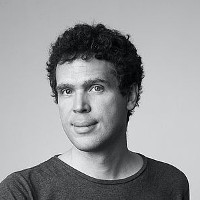
Camille Roth
Title : Serendipity or confinement? Deconstructing the principles, effects, and uses of algorithmic recommendation
Abstract : The effects of algorithmic recommendation in online systems is the subject of growing interest and, also, of sometimes conflicting results, depending on whether it is said to contribute to expand or to restrain the horizon and serendipity of users. We will recontextualize this debate by distinguishing different areas of algorithmic activity on platforms: upstream (principles), in situ (suggestions) and downstream (uses). We further illustrate each case with recent results. Upstream, we show that the design of these algorithms is similar to a largely self-piloted evolutionary dynamics. In situ, we describe topological and likely navigational biases induced by content suggestion on YouTube, relying in particular on an extensive collection of ad hoc data. Downstream, we exhibit a variety of attitudes toward recommendation using data from the online music listening platform Deezer, showing in particular how users’ preferences affect the influence of recommendation, rather than the other way around.
Bio : Camille Roth has been holding a research professorship at CNRS since 2008 in computer science while he also had a couple of tenured university positions in sociology, at Sciences Po as Associate Professor (“professeur”, 2016-18) and in Toulouse as Assistant Professor (“maître de conférences”, 2007-08). His research thus lies at the interface between social and computational sciences, featuring keywords such as socio-semantic systems, social cognition, algorithms and mathematical sociology.
He founded in 2012 and currently leads the computational social science team at Centre Marc Bloch in Berlin (CNRS/Humboldt) and currently supervises a team of several doctoral and post-doctoral researchers. He is currently the recipient of an ERC Consolidator grant called Socsemics on socio-semantic networks and over the past decade has been global or local PI for several multi-institution research projects, both at the French and European level, on blog networks, scientific communities, and peer-to-peer platforms, including Webfluence, Algopol and Algodiv (on informational dynamics of the digital public space) and QLectives (EU IP on quality collectives in socio-technical communities). He has authored more than 70 peer-reviewed publications. He is also associate member of CAMS (Centre d’Analyse et de Mathématique Sociales, CNRS-EHESS).

Mel Slater
Title : Immersive Social Media and the Metaverse
Abstract : Virtual Reality and immersive systems in general have been the subject of research and application since the 1960s. During that time enormous advances have been made in hardware, software, and understanding of how these systems deliver such a strong illusion of presence to people that they act and respond realistically. Hitherto virtual reality required very expensive systems available only to a few labs and industry, whereas today it has become a consumer product with excellent systems available at the cost of a Smartphone. This development may reach a new stage through the idea of the ‘metaverse’ where millions of people carry out many aspects of their daily life in shared immersive systems. This could be a tremendous boost to creativity, and may have positive effects on climate change, limiting the need for travel. However, the ethical and data protection issues surrounding this eventually need to be seriously considered. Just as social media and Smartphones led to massive, unexpected consequences for society, so the same may be true at an even greater level for the metaverse. This talk will outline a set of possibilities and a possible framework for avoiding some of the potential negative consequences.
Bio : Mel Slater is Distinguished Investigator at the University of Barcelona in the Department of Clinical Psychology. From 2006 to 2017 he was a member of the ICREA, the Catalan Institution for Research and Advanced Studies. He‘s co-Director of the Event Lab (Experimental Virtual Environments for Neuroscience and Technology). His background is computer science in the field of computer graphics and virtual reality. He started a VR research group at what is now Queen Mary, University of London in 1990, and he joined the Department of Computer Science at UCL in 1996 where he founded the Virtual Environments and Computer Graphics group, and was Professor of Virtual Environments from 1997. He was Immersive Fellow with London’s Digital Catapult 2017 and 2018. He’s also a co-Founder of Virtual Bodyworks S.L.
His major research interest is the question of what makes virtual reality work: how is it possible to build virtual environments such that people respond realistically to events within them? What scientific explanations are there of this phenomenon? He‘s interested in virtual reality for the creation of social scenarios. He’s also interested in using the power of virtual reality for changing the self, research that is focused at the interface between computer science and neuroscience.
Challenge Session
Richard Rogers (University of Amsterdam) Depoliticising Social Media ?
Lidia Dutkiewicz (CiTiP, KU Leuven) Epistemic welfare and algorithmic gatekeepers.
Noémie Kenck (CiTiP, KU Leuven) Setting fire to inflammatory content & creating mental distress, what safegards against reccomander systems impact ?

